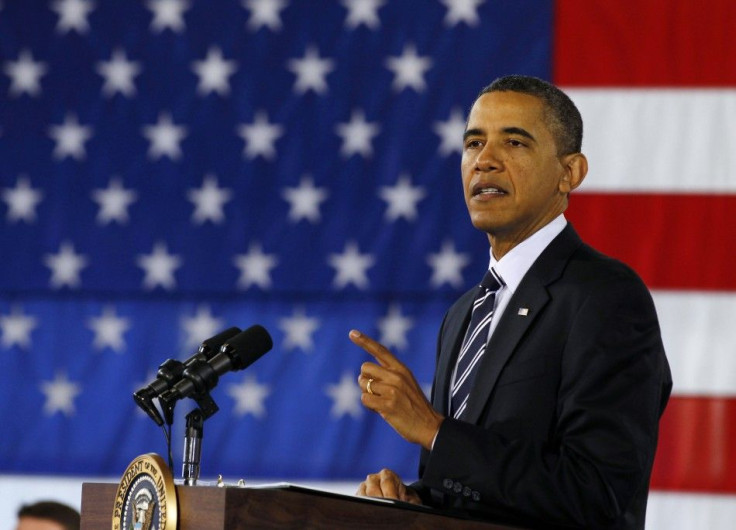Obama shift seeks to defuse birth-control fight

President Barack Obama, in an abrupt policy shift aimed at quelling an election-year firestorm, announced on Friday that religious employers would not be required to offer free birth control to workers and that the onus would instead be put on insurers.
The compromise sought to accommodate religious organizations, such as Catholic hospitals and universities, outraged by a new rule that would have required them to offer free contraceptive coverage to women employees.
Instead, the new approach puts the burden on insurance companies, ordering them to provide workers at religious-affiliated institutions with free family planning if they request it, without involving their employer at all, the White House said.
The result will be that religious organizations won't have to pay for these services, Obama told reporters in the White House briefing room. But women who work at these institutions will have access to free contraceptives just like other women.
Weighing in publicly on the issue for the first time, Obama acknowledged that religious groups had genuine concerns about the birth control rule, but he accused some of his opponents of a cynical effort to turn the issue into a political football.
The rule had sparked an outcry from Catholic Church leaders, Republican lawmakers and other social conservatives who denounced it as an attack on religious freedom. It had also sown dissent among some of Obama's top advisers.
Health insurance giant Aetna Inc said it would comply with the policy but needed to study the mechanics of this unprecedented decision before we can understand how it will be implemented and how it will impact our customers.
Republicans seized on the issue, seeing a chance to paint Obama as anti-religion and put him on the defensive as signs of economic improvement appear to have re-energized his re-election bid.
The policy shift was aimed at preventing the issue from becoming a liability for Obama with Catholic voters, while at the same time trying not to anger his liberal base. But it was unlikely to assuage all of the concerns of church leaders, who offered no immediate reaction.
But Sister Carol Keehan, president of the Catholic Health Association of the United States, praised the result, saying she was pleased and grateful that the religious liberty and conscience protection needs of so many ministries that serve our country were appreciated.
While Obama's fellow Democrats also lauded the move, Fred Upton, Republican chairman of the House of Representatives Energy and Commerce Committee, rejected it and said he remained committed to rescinding it. The prospects for that are dim in a deeply divided Congress.
The controversy pushed a hot-button social issue into the media spotlight ahead of November 6 presidential and congressional elections. Republicans hope to use it to galvanize their conservative base, but it is unclear whether it will resonate with the broader electorate.
'IT'S HUGE'
The regulation at the center of the controversy requires religious-affiliated groups such as charities, hospitals and universities, but not churches themselves, to provide employees coverage for birth control as other health insurance providers must do. The Catholic Church opposes most methods of birth control.
Obama insisted that the revised policy, which came after he ordered aides to speed up their review of the controversial new rule, would ensure religious liberty while protecting women's health.
The compromise was crafted by employees of the White House Office on Faith Based and Neighborhood Partnerships.
Sources close to the deliberations said many in the office were dismayed by the original plan released by the administration last month.
With hundred of pastors across the country reading letters of protest during Mass and tens of thousands of concerned citizens signing an online petition demanding changes, members of the White House's faith-based team scrambled to come up with an alternative that would still meet the administration's goal of expanding access to family planning for all women.
Honestly, it's a win for all sides. It's huge, said Stephen Schneck, a political scientist at the Catholic University of America who has advised the administration on outreach to Catholics.
The issue had triggered internal debate at the White House.
Prominent Catholics in the White House - including Vice President Joe Biden, Defense Secretary Leon Panetta, and longtime Obama aide Denis McDonough - were said to have helped drive the compromise.
The plan announced Friday was one of the few possible solutions that would not have required legislation, but could be imposed by executive order.
The policy shift was welcomed by some women's groups. Cecile Richards, president of Planned Parenthood Federation, issued a statement saying the new plan does not compromise a woman's ability to access these critical birth control benefits.
Polls indicate a majority of Americans and Catholics support the rule. A Public Religion Research Institute poll taken last week found 55 percent of Americans want employers to provide healthcare plans that cover contraception and birth control, including nearly six in 10 Catholics.
© Copyright Thomson Reuters 2024. All rights reserved.




















